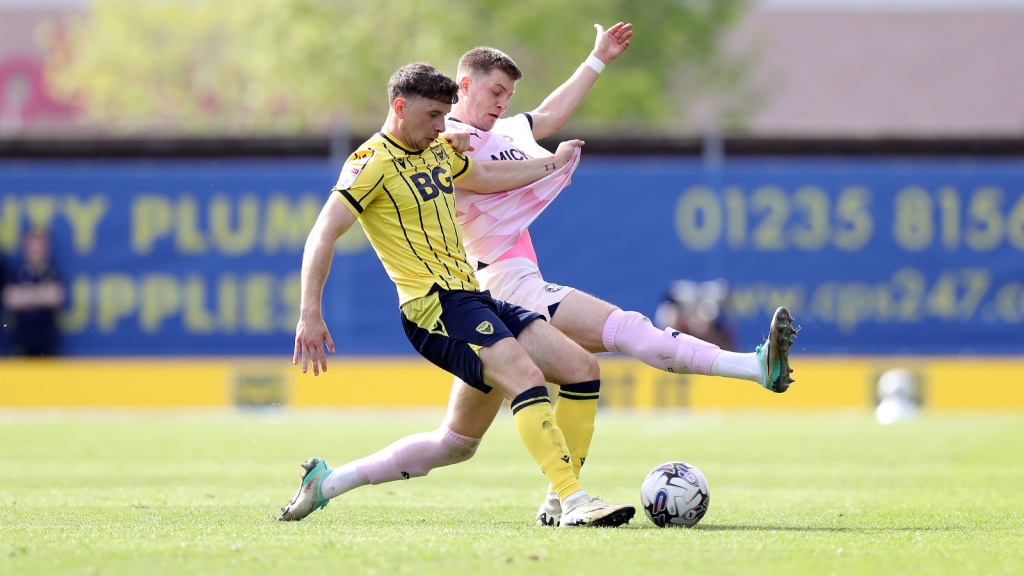
It was never going to be anything other than monumental, we’d reached a point of complete singularity. The path to progress was binary, the margins had eroded to nothing, there was no tomorrow or next week, we either did or we didn’t. All the ifs, buts, and could-have-beens, the weren’ts and weres coagulated into a mass as dense as a neutron star. Now it needed to pass through a hole the size of a pin prick.
For me, the churning nerves started during the latter stages of the second leg between Bolton and Barnsley. Bolton had been cruising before Barnsley started to fight back. They failed, ultimately, but it revealed another side to Bolton, one who weren’t inevitably going to be crowned at Wembley. If Barnsley can give them a fright, a team embroiled in a psychodrama of their own making, then maybe we could too. And if we could give them a game, then maybe beating Peterborough meant something.
The scramble for tickets and an ill-planned work meeting meant I had to watch the second leg on TV. There were many reasons for wanting to be there, but one is that anxiety requires a host and when there’s nobody else around you have no other option but to internalise it while the world around you stays normal. At least when you’re part of a collective whole, anxiety is a new shared normal.
Inevitably, TV needed to invent a narrative for the game, it’s not bias, though it’s often mistaken for that, it’s just they have a need to present something coherent to a largely disinterested nation. Peterborough was the thread they chose to follow; their venomous attack – the most potent in the division – and how resolute we’d need to be to withstand them.
John Mousinho, in the studio, embarked on a particularly elongated analysis of our defensive shape, and the flaws within it. This would have been fine if it had been based on a premise that was remotely correct. We don’t have ‘four across midfield’ nor ‘two nines’ (or was it two tens? or a ten and a seven?). Civilisations collapsed in the time Mousinho got through his ambling. The sage of League One had set the narrative.
Darren Ferguson had it all figured out too; patience would be enough, he said, with that we would eventually bow to their pressure. The story seemed pre-written, it now just needed to be told.
But, it wasn’t just Mousinho’s tactical analysis that had misread us, there’s a renewed realignment across the club, we are no longer pointing fingers at each other, we are all facing the direction we want to go. The displays off the field, the performances on it, the owners who help bind it all together, we are all aligned.
The early exchanges did little to challenge the agreed position, Peterborough came to apply a constant, unrelenting pressure until we buckled. And when we buckle, they reckoned, the floodgates would open. The commentary team purred their appreciation, satisfied that the things would conclude satisfactorily. There is nothing better than to be proved right.
But we absorbed the pressure, broke up the play, if we needed to, we conceded awkward, niggly, technical, tactical fouls. In plain sight, we were dismantling the agreed narrative. Each narrow miss or block seemed to fragment them a little more; the frustrations grew, the fans became tense, chances were snatched at.
On the sidelines stood Des Buckingham, impassive, unblinking. He’s a nice guy, measured and level headed, he’s been schooled in the right way. Beyond the steely gaze, there was a deep sense of satisfaction. Elliott Moore admitted the gameplan hadn’t been to absorb that much pressure, it hadn’t been the intention for Cameron Brannagan to head Josh Murphy’s deep cross back across the goal in the first leg either. Buckingham reached beyond the textbook and brought about an inventive street-smarts not even the arch cat fighter Karl Robinson had been able to unlock.
In the commentary box, to his credit, Don Goodman began to shift; Peterborough had all the possession, but their narrative was fragmenting. They controlled the ball, but we controlled the game.
And then we conceded, a deep ball to the back post, Harris outmuscled by Knight who executed a neat finish into the net. That should have been it, their story had been reconstructed, all they needed to do now was complete it.
London Road ignited, flares were hurled onto the pitch, the breakthrough had come, the party had started, the job was all but done. The ‘borough players needed to surge while we were rattled, while the fragments of doubt fermented. Instead, they were forced to wait. A steward with a litter picker discarded a flare like he was disarming an undetonated bomb.
Their delay killed their momentum. We regrouped, the pattern returned. Our defending was resolute and niggly, occasionally it stepped over the mark, but not too much, just enough.
The delays clearing the flares added a few minutes to injury time, in that time we won a free-kick right on the edge of the box. It looked dangerous but really it was too close. If their wall stood firm, Brannagan would have nowhere to put his strike. An organised wall and a clear mind would send them into the break with the lead and surely the tie.
Brannagan’s drive was true and fierce, Burrows flinched, a momentary lapse, the ball cannoned off his arm. Penalty. The narrative was turning, slipping through their fingers. Brannagan’s spot kick was a formality.
We gained the initiative by conceding the initiative, Buckingham’s team had unlocked the most elusive treasure, a Plan B. Block, head, re-set, waste time. They had all the possession, gaining territory inch by inch, but it was predictable. If we could hold our shape, they offered no surprises.
Their advances were slow, our blocks became more resolute, a strand of hair came loose from Ciaron Brown’s man-bun, the dark lord was in his element. When they did penetrate our defences, Sam Long scrambled the ball off the line to safety.
The whole team were in simpatico, the noise of the Oxford fans weaving through any gaps. The menacing Ephron Mason-Clark attacked down the right, Knight caught his cross in full flight. Cumming, quietly heroic across both legs, making difficult things look simple, extended full-stretch, parrying the ball away. It looked spectacularly comfortable. He and Moore embraced, they just seemed to need someone to hold, just for a moment.
Injuries were taken and fouls shared around, there’s beauty in the ugliest things. We were doing to others what is frequently done to us. Mason-Clark lunged at a final, desperate throw to the back post, it was beyond him. It was beyond them.
We’d passed through the pinhole by breaking up the narrative and reconstructing it in our vision. At times it was grotesque, the antithesis of The Way Things Should Be Done. The clinical and analytical was cast aside and in its place came selflessness, togetherness, relentlessness and resilience. Behaviours, they call it.
The fans, the staff and the players celebrated together, we go to Wembley as one.





